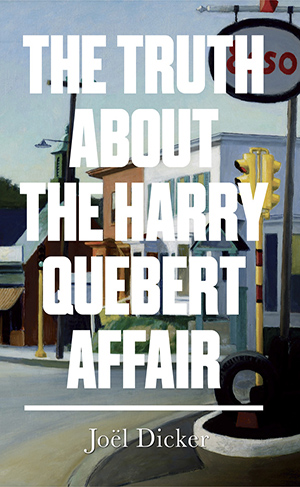I first heard about this book at the Frankfurt Book Fair two years ago. It was one of those classic book fair stories where everyone is dying for some gossip; something extraordinary to tell the next person they meet. In October 2012, The Truth About the Harry Quebert Affair was exactly that book. It had a great story to match, a 28 year old, good-looking author (incidentally, not unlike the author in the book), an old publisher about to retire, stumbling over a goldmine. The novel was sold to 32 territories for extraordinary sums and has since gone on to sell more than two million copies. So far, so good…
The Truth About the Harry Quebert Affair is the story of Marcus Goldman, an author who’s come up against a serious case of writer’s block after his hugely successful literary debut. When his mentor, famous author Harry Quebert, is accused of killing 15 year old Nola Kellergan, a murder committed 30 years ago, Marcus travels to the small New Hampshire town of Somerset to help his friend. As it happens, Harry, then 35, had an illicit affair with the Lolita-like Nola. His best-selling novel, the incriminatingly named The Origin of Evil, is found next to the body buried in Harry’s garden. As Marcus starts investigating the murder his writer’s block disappears.
I love a page-turner as much as the next person, but this book just didn’t do it for me. There are two major problems: firstly, is it badly written. How about this one, for example: ‘Bullshit!’ Roth said, who resorted to foul language easily when he was annoyed.’ Or ‘You’re asking me about love, Marcus, but love is complicated.’ Or what about this one: ‘She collapsed to the ground. He recoiled in horror. There was blood everywhere. She was dead.’ Eh? Could it be the translation? Unlikely. You would think that a publisher who has invested this kind of money in a book would, at the very least, make sure that part works.
Well, to be fair, it is not the first badly written crime/thriller in the history of literature so let’s give it another chance.
The second and, possibly, more serious problem is that it’s not very believable. Our protagonist, 28-year-old Marcus, has made a killing from his first book, so much so that he has his own Range Rover and private secretary, he is accosted on the street by adoring fans and attends all the glamorous New York City parties. Hmm…
Marcus is, by his own admission, such a conman that he managed to become a hero at his high-school (gaining his nickname is Marcus the Magnificent) by being the star player on the least popular sports team: volleyball. Really?
Clearly ambitious, but without skills to match, Marcus somehow gets offered places at Yale and Harvard, but chooses instead the mediocre Burrows College. I am sorry, it just doesn’t add up.
When Harry Quebert moves to Somerset, the whole town is in awe of this reportedly genius of an author, only problem is that Harry hasn’t published a thing. Didn’t anyone try to buy his books? Are they all just gullible idiots?
Somehow Marcus succeeds in getting all kinds of confidential information about the murder out of the officer in charge of the investigation, Sergeant Gahalowood, who not only knows that Marcus is the main suspect’s best friend, but who has also arrested Marcus for trespassing on the murder site. Really? And on and on it goes, for 657 pages, no less.
According to Marcus himself, he’s always been a bit of a smooth operator, spending lots of effort giving the impression of genius and talent, where there really is very little of both. Creating hype around his own character is Marcus speciality. Hmmm…is the author trying to tell us something? About this book? About himself?
The Truth About the Harry Quebert Affair has been compared to Jonathan Franzen and Philip Roth, has been called an example of a ‘Great American novel’ and a metaphysical story. There have been no limits to the hype.
I would call it a run-of-the mill murder mystery.
To be fair, Dicker pulls off some clever twists and turns in the story, but when the characters feel like paper dolls and the language makes you cringe, who will believe him?
Well done to Jöel Dicker and his publisher for creating the literary equivalent of a dot painting!
The Truth About the Harry Quebert Affair by Jöel Dicker is published by MacLehose Press, 657 pages.





